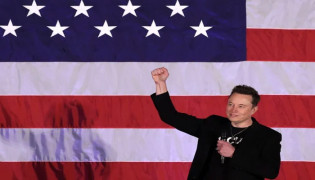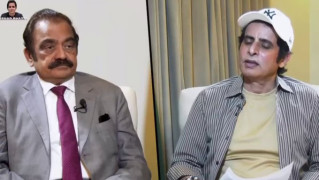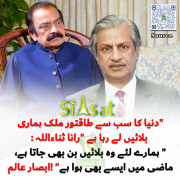desan
President (40k+ posts)
Supreme Court declares Pakistan Olympic Association as an autonomous body free of Government control
The Supreme Court of Pakistan, in a landmark and historic judgement, while deciding a number of appeals of the Pakistan Olympic Association (POA), has acknowledged that the National Olympic Committee (NOC) Pakistan is an autonomous and independent body free of Federal, Provincial Governments and Pakistan Sports Board (PSB) control, and that no writ, under Article 199 of the Constitution of Pakistan, is maintainable against the POA. With the Apex Court’s judgement, years long misconception that the POA comes under the ambit of the Federal Government has ended. The Supreme Court has maintained that the Federal Government does not exercise substantial control on, or have dominance in the controlling affairs of the POA, and no financial interest of the State lies in the functions of the POA. The Supreme Court has also declared the elections of the POA held in 2012 as legal, while setting aside a judgment of the Lahore High Court (LHC) against those elections. The date of hearing of the said appeals/case was November 14, 2018 and the judgement was announced on January 1, 2019, by a three-member bench, headed by Chief Justice of Pakistan Mr Mian Saqib Nisar, with Mr Justice Ijazul Ahsan and Mr Justice Sajjad Ali Shah as other two members.
The background of the appeals/case was that the elections held on 04-02-2012 for all the posts within the POA, except that of the President, were not held through secret ballot but instead through a show of hands in contravention of POA Rules. Aggrieved by this, certain persons filed a writ petition before the Lahore High Court which was accepted and the elections were declared to be illegal and without lawful authority. The LHC judgment was challenged by the POA and its officials before the Supreme Court of Pakistan.
The judgement, authored by the CJP, while relying on a number of citations of the Apex Court, held that: “It is an undisputed fact that the Association is not controlled by the Federal Government, neither is it a statutory body nor has it acquired any affiliation from the PSB (Pakistan Sports Board).” While deciding the legal point that whether the POA is a ‘Person’ who performs the function of the State and can be controlled by the Government, the Apex Court held: “The Association organises National Games, represents Pakistan at international sporting events, scrutinises, approves, and guarantees the candidature of any city or organisation applying for staging at international sporting events, and is also responsible for the promotion and development of sports in Pakistan. None of the above functions involve the exercise of sovereign power or public power, and do not constitute a function or duty of the state. It is not exclusively State managed organisations who may bear the Pakistan flag or incorporate it into their identity. Therefore, no functions of the State involving sovereign or public power are being exercised by the Association. While it is true that Federal Government approves the selection of contingents and gives its consent to the Association representing Pakistan at international events, we do not find that this amounts to executive control. The Federal Government does not exercise decision making authority even if the PSB is involved in scrutinising and approving teams.”
The Supreme Court, while mentioning the POA Aims and Objectives, held that: “its autonomy, dignity and independence in accordance with the Olympic Charter are not to be compromised.” Regarding funding to the POA by the Government, the Supreme Court held: “The Federal Government does provide funding to defray the costs of sending contingents to the Olympics, however the private activities and other management of the organisation is funded by the Association itself. The overall activities of the organisation are independent and the bulk of the activities carried out are privately funded. A single activity/undertaking is funded by the Federal Government (i.e. sending teams to the Olympics) and while it is an expensive undertaking, it is only part of what the Association does.”
The Supreme Court, while deciding another question of law whether a writ is maintainable against the POA in terms of Article 199(1)(c) of the Constitution, held: “… Article 199(1)(c) is contingent on the fact that the matter should involve the enforcement of fundamental rights guaranteed under the Constitution. In the instant case, the fundamental rights being relied on by the learned counsel in making such argument are Articles 9, 14, 17, 18, and 25 of the Constitution, all of which do not seem relevant in the instant matter. We do not find that the internal functioning of the Association, particularly the method of elections of certain posts thereof, deprives persons of the right to life or liberty (Article 9 of the Constitution), violates the dignity of man (Article 14 of the Constitution), curtails the right to freedom of association (Article 17 of the Constitution), trade, business or profession (Article 18 of the Constitution), or is discriminatory in any manner whatsoever (Article 25 of the Constitution). Therefore, we do not find that a writ is maintainable against the Association under Article 199(1)(c).”
All’s well that ends well: It is pertinent to mention that the Pakistan Olympic Movement remained under a siege from 2012 till December 2015 as a handful of mischievous sports elements with the help Pakistan Sports Board, Inter Provincial Coordination Committee (IPC) and some Federal Government officials left no stone unturned to destroy the very fabric of the sports in the country and invite the wrath of the International Olympic Committee (IOC) by openly and shamelessly violating the Olympic Charter.
For the first time in the history of Pakistan sports, the intense and dirty power struggle spearheaded by these disgruntled elements resulted in formation of a parallel National Olympic Committee, many parallel National Sports Federations, Pakistan hockey’s ouster from the 2014 Glasgow Commonwealth Games and forcible occupation of Olympic House in Lahore.
The sports scenario of Pakistan remained murky and polluted throughout this period due to a rift between the Pakistan Olympic Association and the PSB. The PSB, backed by the Federal Government, tried its best to implement the National Sports Policy under which no National Sports Federation head can have more than two tenures, and expected the POA to follow suit. But POA chief Lt Gen (r) Syed Arif Hasan, who won a fourth term in 2016, refused to follow the PSB directives, saying the POA was an autonomous body that would only follow IOC Charter and Rules. It is no secret that the IOC does not tolerate any Government interference in working of its member country as is evident from the attempts by the Indian Government to dictate terms to the IOC which resulted in India’s suspension. Despite getting many stern IOC warnings including that of suspension of the country, these elements, the PSB and the IPC continued with their circus unabated and with impunity.
The unlawful and unconstitutional activities of these rouge elements caused embarrassment to Pakistan sports which deteriorated to the lowest level during this period. The IOC finally asked the Pakistan Government to revise and review the conflictive issues of the National Sports Policy to make it fully compatible with the basic principles and rules that govern the Olympic Movement or face suspension from international sports. Better sense prevailed and the Government finally agreed to follow the Olympic Charter. The POA is the main pillar of the Pakistan sports structure. The IOC’s attempt to keep sports at arm’s length from politics is the right decision because, in the IOC parlance, that’s what Government interference amounts to. Many Governments around the globe had tried to dictate terms to the IOC in the past but its strict laws had always failed such attempts. With the historic decision of the Supreme Court in the first month of 2019, all doors have been closed to pollute the Olympic Movement in Pakistan and violate the Olympic Charter by the disgruntled elements who have their own axe to grind.\
The Supreme Court of Pakistan, in a landmark and historic judgement, while deciding a number of appeals of the Pakistan Olympic Association (POA), has acknowledged that the National Olympic Committee (NOC) Pakistan is an autonomous and independent body free of Federal, Provincial Governments and Pakistan Sports Board (PSB) control, and that no writ, under Article 199 of the Constitution of Pakistan, is maintainable against the POA. With the Apex Court’s judgement, years long misconception that the POA comes under the ambit of the Federal Government has ended. The Supreme Court has maintained that the Federal Government does not exercise substantial control on, or have dominance in the controlling affairs of the POA, and no financial interest of the State lies in the functions of the POA. The Supreme Court has also declared the elections of the POA held in 2012 as legal, while setting aside a judgment of the Lahore High Court (LHC) against those elections. The date of hearing of the said appeals/case was November 14, 2018 and the judgement was announced on January 1, 2019, by a three-member bench, headed by Chief Justice of Pakistan Mr Mian Saqib Nisar, with Mr Justice Ijazul Ahsan and Mr Justice Sajjad Ali Shah as other two members.
The background of the appeals/case was that the elections held on 04-02-2012 for all the posts within the POA, except that of the President, were not held through secret ballot but instead through a show of hands in contravention of POA Rules. Aggrieved by this, certain persons filed a writ petition before the Lahore High Court which was accepted and the elections were declared to be illegal and without lawful authority. The LHC judgment was challenged by the POA and its officials before the Supreme Court of Pakistan.
The judgement, authored by the CJP, while relying on a number of citations of the Apex Court, held that: “It is an undisputed fact that the Association is not controlled by the Federal Government, neither is it a statutory body nor has it acquired any affiliation from the PSB (Pakistan Sports Board).” While deciding the legal point that whether the POA is a ‘Person’ who performs the function of the State and can be controlled by the Government, the Apex Court held: “The Association organises National Games, represents Pakistan at international sporting events, scrutinises, approves, and guarantees the candidature of any city or organisation applying for staging at international sporting events, and is also responsible for the promotion and development of sports in Pakistan. None of the above functions involve the exercise of sovereign power or public power, and do not constitute a function or duty of the state. It is not exclusively State managed organisations who may bear the Pakistan flag or incorporate it into their identity. Therefore, no functions of the State involving sovereign or public power are being exercised by the Association. While it is true that Federal Government approves the selection of contingents and gives its consent to the Association representing Pakistan at international events, we do not find that this amounts to executive control. The Federal Government does not exercise decision making authority even if the PSB is involved in scrutinising and approving teams.”
The Supreme Court, while mentioning the POA Aims and Objectives, held that: “its autonomy, dignity and independence in accordance with the Olympic Charter are not to be compromised.” Regarding funding to the POA by the Government, the Supreme Court held: “The Federal Government does provide funding to defray the costs of sending contingents to the Olympics, however the private activities and other management of the organisation is funded by the Association itself. The overall activities of the organisation are independent and the bulk of the activities carried out are privately funded. A single activity/undertaking is funded by the Federal Government (i.e. sending teams to the Olympics) and while it is an expensive undertaking, it is only part of what the Association does.”
The Supreme Court, while deciding another question of law whether a writ is maintainable against the POA in terms of Article 199(1)(c) of the Constitution, held: “… Article 199(1)(c) is contingent on the fact that the matter should involve the enforcement of fundamental rights guaranteed under the Constitution. In the instant case, the fundamental rights being relied on by the learned counsel in making such argument are Articles 9, 14, 17, 18, and 25 of the Constitution, all of which do not seem relevant in the instant matter. We do not find that the internal functioning of the Association, particularly the method of elections of certain posts thereof, deprives persons of the right to life or liberty (Article 9 of the Constitution), violates the dignity of man (Article 14 of the Constitution), curtails the right to freedom of association (Article 17 of the Constitution), trade, business or profession (Article 18 of the Constitution), or is discriminatory in any manner whatsoever (Article 25 of the Constitution). Therefore, we do not find that a writ is maintainable against the Association under Article 199(1)(c).”
All’s well that ends well: It is pertinent to mention that the Pakistan Olympic Movement remained under a siege from 2012 till December 2015 as a handful of mischievous sports elements with the help Pakistan Sports Board, Inter Provincial Coordination Committee (IPC) and some Federal Government officials left no stone unturned to destroy the very fabric of the sports in the country and invite the wrath of the International Olympic Committee (IOC) by openly and shamelessly violating the Olympic Charter.
For the first time in the history of Pakistan sports, the intense and dirty power struggle spearheaded by these disgruntled elements resulted in formation of a parallel National Olympic Committee, many parallel National Sports Federations, Pakistan hockey’s ouster from the 2014 Glasgow Commonwealth Games and forcible occupation of Olympic House in Lahore.
The sports scenario of Pakistan remained murky and polluted throughout this period due to a rift between the Pakistan Olympic Association and the PSB. The PSB, backed by the Federal Government, tried its best to implement the National Sports Policy under which no National Sports Federation head can have more than two tenures, and expected the POA to follow suit. But POA chief Lt Gen (r) Syed Arif Hasan, who won a fourth term in 2016, refused to follow the PSB directives, saying the POA was an autonomous body that would only follow IOC Charter and Rules. It is no secret that the IOC does not tolerate any Government interference in working of its member country as is evident from the attempts by the Indian Government to dictate terms to the IOC which resulted in India’s suspension. Despite getting many stern IOC warnings including that of suspension of the country, these elements, the PSB and the IPC continued with their circus unabated and with impunity.
The unlawful and unconstitutional activities of these rouge elements caused embarrassment to Pakistan sports which deteriorated to the lowest level during this period. The IOC finally asked the Pakistan Government to revise and review the conflictive issues of the National Sports Policy to make it fully compatible with the basic principles and rules that govern the Olympic Movement or face suspension from international sports. Better sense prevailed and the Government finally agreed to follow the Olympic Charter. The POA is the main pillar of the Pakistan sports structure. The IOC’s attempt to keep sports at arm’s length from politics is the right decision because, in the IOC parlance, that’s what Government interference amounts to. Many Governments around the globe had tried to dictate terms to the IOC in the past but its strict laws had always failed such attempts. With the historic decision of the Supreme Court in the first month of 2019, all doors have been closed to pollute the Olympic Movement in Pakistan and violate the Olympic Charter by the disgruntled elements who have their own axe to grind.\






































